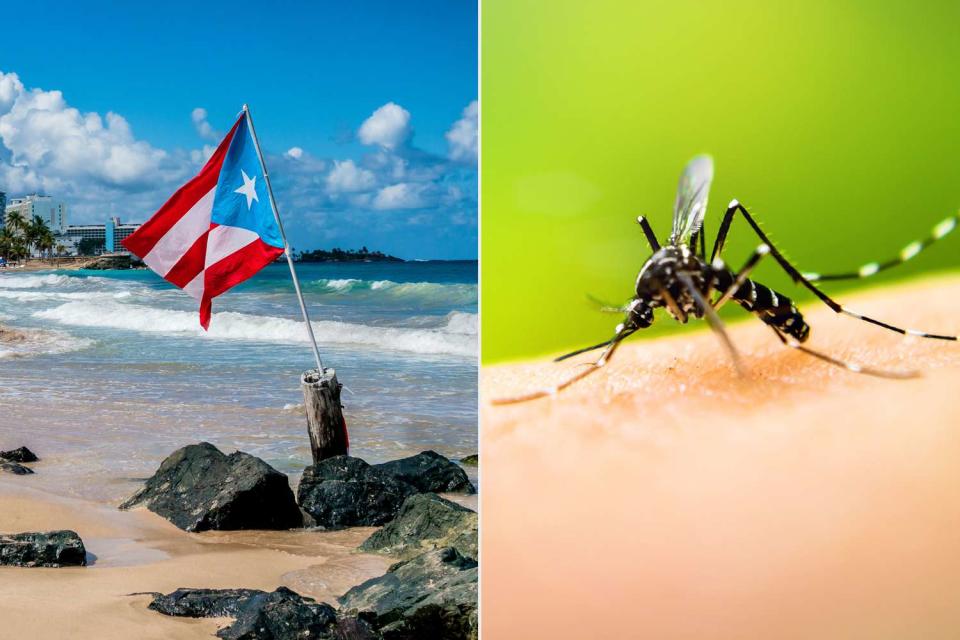Puerto Rico Declares Dengue Fever Epidemic amid Spike in Cases
The illness, which can be fatal, is spread by mosquitoes

Getty (2)
A beach in Puerto Rico, where there is an epidemic of dengue feverPuerto Rico has declared an epidemic amid a spike of dengue fever, an at-times fatal illness spread by mosquitoes
The Commonwealth — which is home to 3.2 million people and is a popular destination for spring break — has reported 549 cases
Warmer temperatures due to climate change have encouraged the growth of mosquito populations
Puerto Rico has declared an epidemic of dengue fever — the mosquito-borne illness that can, at times, be fatal — amid a spike in cases.
On Monday, "a declaration of public health emergency due to dengue" was issued by the Puerto Rico Department of Health. In a press release from the department, Secretary Carlos Mellado López said, “This year, dengue cases have exceeded historical figures."
"The teams have been working on the integrated plan for prevention and control in response to arbovirus and we are going to expand the implemented response," he continued.
The Commonwealth — which has a population of 3.2 million people, is also a popular destination for those on spring break — has reported 549 cases of dengue in 2024, according to the Associated Press. For the entirety of 2023, there were 1,293 cases in total.

Getty
Old San Juan in Puerto RicoPer the AP, most of the cases have been reported in the capital of San Juan, and while dengue varies in severity, more than 340 people have been hospitalized for it.
"It is important to note that the increase in cases has not only been reflected in Puerto Rico, but we have seen it throughout the region of the Americas,” López said, per the release.
The AP reported that "the region has reported some 3 million cases so far this year, with health officials noting that higher rainfall along with humidity and heat linked to climate change have contributed to a rise in cases."
Related: Three States Now Reporting Malaria Cases from Infected Mosquito Bites, Prompting CDC Alert
The Centers for Disease Control and Prevention said 25% of those who are bitten by an infected mosquito will get sick — and those symptoms can range from mild to severe.
Per the CDC, mild symptoms include nausea, vomiting, rash, and body pains — specifically behind the eyes, or in the muscles and joints.
Those who have had dengue before are more likely to develop a severe case, which the CDC said “can be life-threatening within a few hours.” Symptoms include belly pain, frequent vomiting or internal bleeding.
Treatment includes acetaminophen, rest, and fluids. And those with dengue are advised to watch out for warning signs of severe dengue.
Related: 2 Billion Genetically Altered Mosquitoes Will Be Released in Fla. and Calif. to Fight Disease
The CDC said those who notice symptoms of severe dengue should "see a healthcare provider or go to the emergency room immediately." The organization added, "Severe dengue is a medical emergency. It requires immediate medical care."
"It is essential to recognize the symptoms early... In the presence of any of these symptoms, it is recommended to look for medical attention immediately," López said, per the release.
The rise in mosquito populations, meanwhile, has been attributed to climate change, the Environmental Protection Agency shared in a report on the West Nile Virus, which is also spread via mosquitoes.
“Studies show that warmer temperatures associated with climate change can accelerate mosquito development, biting rates, and the incubation of the disease within a mosquito,” the EPA said.

Getty
Child gets a vaccineThe Secretary of Health also said that "it is crucial that citizens take immediate and proactive measures to control the spread of the virus and protect themselves and their families."
There is a dengue vaccine available in Puerto Rico, and children ages 9 to 16 who previously have had an infection and are "living in areas where dengue is endemic" are eligible to receive it, the CDC said.
Additionally, in Puerto Rico, the dengue vaccine is a part of the routine childhood immunization schedule, per the CDC.
Never miss a story — sign up for PEOPLE's free daily newsletter to stay up-to-date on the best of what PEOPLE has to offer, from celebrity news to compelling human interest stories.
For more People news, make sure to sign up for our newsletter!
Read the original article on People.

